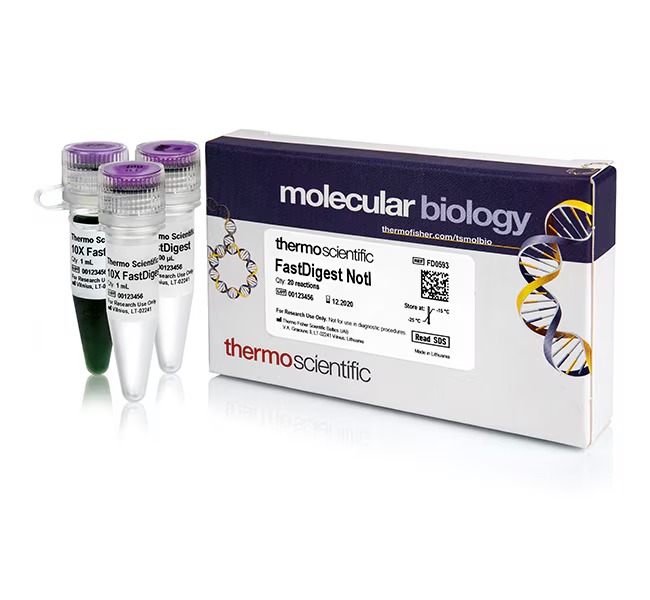Specifications:
| Application | Cloning, Transfection | ||
| Storage Temperature | -20°C | ||
| Product Type | Enzymes | Forms | Liquid |
| Product Brand | Thermo Fisher Scientific™ | ||
| Product Grade | Molecular Biology | ||
Thermo Scientific™ FastDigest NotI is a high-fidelity restriction enzyme that recognizes and cleaves the palindromic DNA sequence 5'- GC↓GGCCGC -3' / 3'- CGCCGG↑CG -5'. It is designed for fast and precise DNA digestion within 5–15 minutes using the universal FastDigest Buffer system, making it an ideal choice for molecular cloning, genomic mapping, and genetic engineering applications.
FastDigest NotI ensures 100% activity in FastDigest and FastDigest Green buffers, enabling rapid and efficient DNA cleavage without the need for buffer changes or additional purification steps. This enzyme is fully compatible with double and multi-enzyme digestions, allowing seamless integration into high-throughput workflows.
Key Features & Benefits
- Ultra-Fast DNA Digestion (5–15 Minutes)
- Provides highly efficient DNA cleavage for cloning and restriction analysis.
- Saves time in plasmid preparation, restriction mapping, and DNA processing.
- 100% Activity in Universal FastDigest Buffers
- Eliminates the need for buffer changes and additional DNA cleanup steps.
- Works seamlessly with FastDigest and FastDigest Green buffers for optimal performance.
- No Star Activity for High-Fidelity Digestion
- Ensures precise, specific cleavage with no off-target cuts.
- Maintains restriction site integrity for downstream applications.
- Direct Gel Loading with FastDigest Green Buffer
- Allows immediate electrophoresis analysis without additional preparation.
- Includes tracking dyes and density reagents for efficient sample loading.
- Compatible with DNA Modifying Enzymes
- Supports direct addition of T4 DNA Ligase, Alkaline Phosphatase, Klenow Fragment, and T4 DNA Polymerase.
- Ensures smooth transitions between restriction digestion and downstream DNA modification steps.
Product Specifications
| Feature | Details |
|---|---|
| Product Name | Thermo Scientific™ FastDigest NotI |
| Catalog Numbers | FD0593 (20 μL, 20 reactions), FD0596 (250 μL, 250 reactions), FD0595 (150 μL, 150 reactions), FD0594 (50 μL, 50 reactions) |
| Recognition Sequence | 5'- GC↓GGCCGC -3' / 3'- CGCCGG↑CG -5' |
| Concentration | 10 U/μL |
| Optimal Temperature | 37°C |
| Compatible Buffers | 10X FastDigest Buffer, 10X FastDigest Green Buffer |
| Heat Inactivation Temperature | 80°C |
| Overhang Type | 5' Protruding Ends |
| Methylation Sensitivity | CpG Methylation-Sensitive, Not Dam/Dcm Methylation-Sensitive |
| Type IIS Restriction Enzyme | No |
| Shipping Conditions | Ice Packs (International), Dry Ice (Bulk Orders) |
| Storage Conditions | -20°C |
| Unit Size | Each |
Use Cases & Applications
1. Molecular Cloning & Recombinant DNA Technology
- Plasmid & Vector Digestion for Gene Cloning
- Produces sticky ends for directional vector-insert ligation.
- Ensures efficient DNA fragment excision for subcloning applications.
- Double Digestion for Seamless DNA Assembly
- Works well with other FastDigest enzymes, eliminating the need for multiple buffers.
- Reduces reaction time while maintaining high specificity.
2. Genotyping & Genetic Variation Analysis
- Restriction Fragment Length Polymorphism (RFLP) Analysis
- Differentiates genetic variants based on restriction enzyme digestion patterns.
- Used in genotyping and population genetics research.
- Single Nucleotide Polymorphism (SNP) Detection
- Helps identify point mutations and insertions/deletions in genomic DNA.
- Supports molecular diagnostics and genetic screening applications.
3. Southern Blotting & DNA Fragment Analysis
- Preparation of DNA Fragments for Hybridization Assays
- Ensures specific and reproducible restriction digestion for probe hybridization.
- Used in gene mapping and epigenetic studies.
- Chromosomal Analysis & Methylation Studies
- Detects methylation status in CpG-sensitive restriction sites.
- Useful for epigenetic profiling and structural variation studies.
4. High-Throughput Cloning & Next-Generation Sequencing (NGS)
- Efficient Restriction Digestion for Library Preparation
- Generates consistent DNA fragments for sequencing library construction.
- Ensures uniform fragment size for quality sequencing reads.
- Compatible with Automated Workflows & Liquid Handling Systems
- Ideal for robotic sample processing in high-throughput genomic workflows.
- Eliminates time-consuming buffer exchanges, streamlining DNA digestion workflows.
Recommended Protocol for FastDigest NotI Digestion
Standard 50 µL Reaction Setup:
| Component | Volume |
|---|---|
| Plasmid or Genomic DNA | 0.5–1 µg |
| FastDigest NotI (10 U/μL) | 1 μL |
| 10X FastDigest Buffer | 5 μL |
| Nuclease-Free Water | Adjust to 50 μL |
Incubation & Post-Digestion Processing
- Digest at 37°C for 5–15 minutes for complete restriction.
- Heat inactivate at 80°C for 20 minutes, if necessary.
- Analyze digestion products on a 1–2% agarose gel using ethidium bromide or SYBR Safe staining.
Storage & Handling Instructions
- Storage Conditions:
- Store at -20°C for long-term enzyme stability.
- Avoid freeze-thaw cycles to maintain enzyme activity.
- Handling Precautions:
- Use sterile, nuclease-free reagents and pipette tips to prevent contamination.
- Work in a DNA-free environment to ensure reproducibility.
- Disposal Guidelines:
- Dispose of enzyme and buffers according to biosafety waste regulations.
- Use approved chemical waste disposal protocols for reaction waste.
Why Choose Thermo Scientific™ FastDigest NotI?
✅ Ultra-fast digestion (5–15 minutes) for rapid cloning workflows
✅ 100% activity in universal FastDigest Buffers—no buffer changes needed
✅ No star activity—ensures high-fidelity restriction site cleavage
✅ Direct gel loading with FastDigest Green Buffer—eliminates extra steps
✅ Compatible with downstream applications, including PCR, ligation, and sequencing
Thermo Scientific™ FastDigest NotI is a high-efficiency restriction enzyme, enabling faster, more precise DNA digestion with reduced workflow complexity, making it ideal for cloning, sequencing, and molecular biology research.
- Pack Size: 20 μL (20 Reactions) 50 μL (50 Reactions) 150 μL (150 Reactions) 250 μL (250 Reactions)




 0
0
